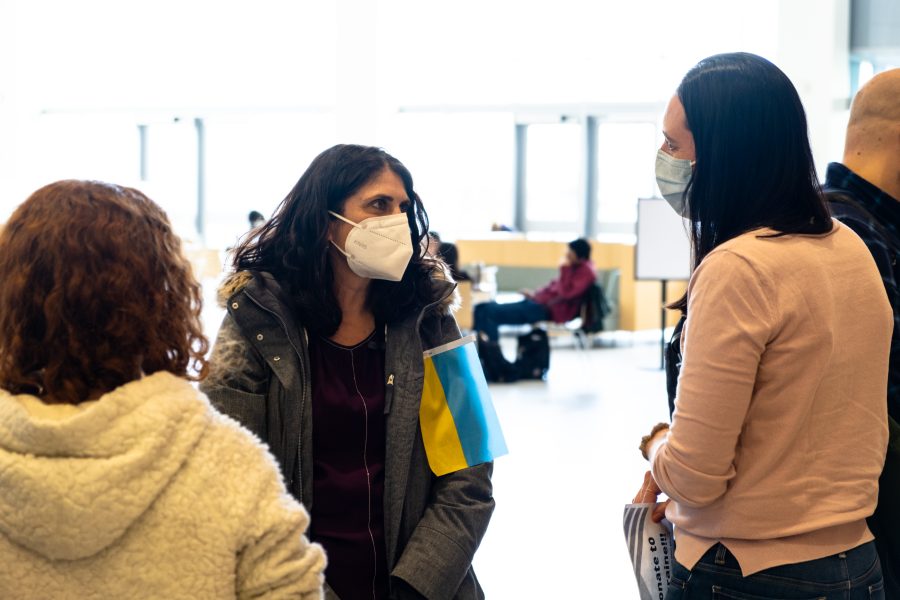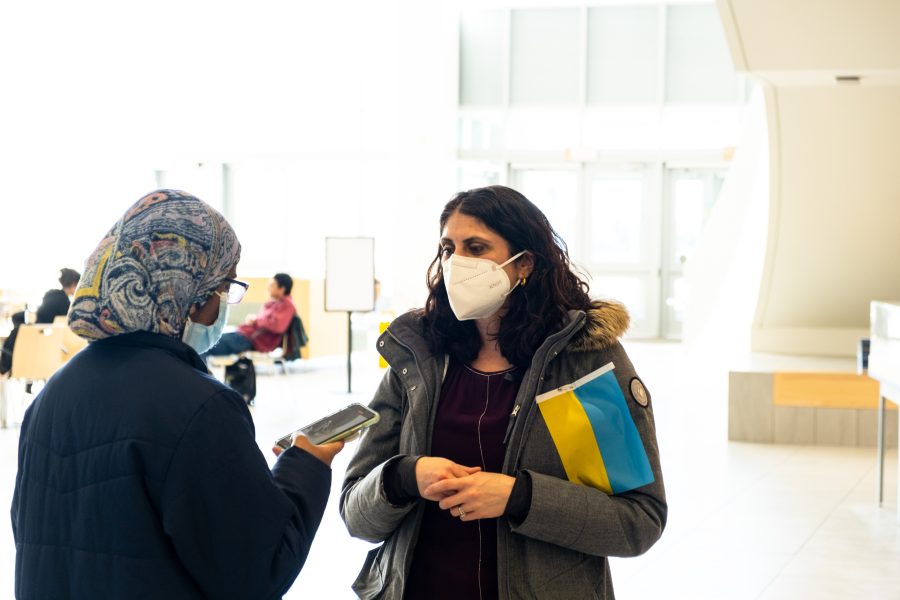On March 3, UMass Boston students and faculty gathered outside of University Hall in order to stand in solidarity with the people of Ukraine amidst its invasion by Russia. Around 20 to 25 students were in attendance, as well as two professors and the dean of the School for Global Inclusion and Social Development.
The event was organized by the UMass Boston Human Rights Group, whose president, Elizabeth Duseau, spoke at the demonstration.
Duseau read a letter that was written by the HRG and signed by the UMass Boston School of Global Inclusion and Social Development, the UMass Boston Undergraduate Student Government, the UMass Boston Global Cultures Club, the UMass Boston Human Rights Minor, and the UMass Boston Women’s, Gender, and Sexuality Studies Department.
“The University of Massachusetts Boston Human Rights Group and Co-Signers are standing in solidarity with the people of Ukraine during this time of conflict,” reads the letter. “Russian military attacks violate the basic human rights of the people of Ukraine. We express deep sympathy and support for individuals and communities affected by this conflict. We call for an international investigation, and for an immediate end to this war.”
The letter also emphasizes a demonstration of solidarity not only for Ukraine, but also for the region as a whole.
“We must keep the human impact at the forefront of our minds at this time,” reads the letter. “We recognize that this war is the work of those in power in Russia, rather than Russian citizens. We join hands with all who are protesting this conflict and affirm the need to respect international human rights obligations. As we stand in solidarity with the people of Ukraine, we also acknowledge that conflicts are currently occurring across the world and deserve notice and sympathy as well.”
The Mass Media spoke with one of the event’s attendees: Professor Cinzia Solari from UMass Boston’s Sociology Department.
The Mass Media asked: “What do you feel about the situation of people not just in Ukraine, but in the region around who are equally affected by this?”
“I think that even the news media is suggesting that the Russian people in Russia are unaware of what exactly is going on in Ukraine, and we think that Putin has done that because he knows that it’s not going to be popular in his own country,” said Professor Solari. “And so, I think that in the U.S., we fall into a sort of Cold War rhetoric easily and that is part of our history. And I just want to caution against that, because folks from the region are intermarried and folks who are here use the Russian language and communicate with folks from all over the place.”
Several other demonstrations have occurred throughout Boston since the initial invasion. On Sunday, Feb. 27, thousands of demonstrators gathered in the Boston Public Garden to show their support for Ukraine, while the next week, on Sunday, March 6, hundreds of Bostonians gathered to demand an end to the conflict with Ukraine.
On Saturday, Feb. 26, a demonstration was held in Cambridge and attended by Harvard and MIT students. Additionally, a candle-light vigil held in Concord was attended by 150 Ukrainian-Americans, individuals with ties to Ukraine, and anti-war protestors.
In addition to showing up to demonstrations, Americans can also aid Ukrainians by donating to several organizations such as UNICEF, Doctors without Borders, Voices of Children, Sunflower of Peace, CARE and more.


